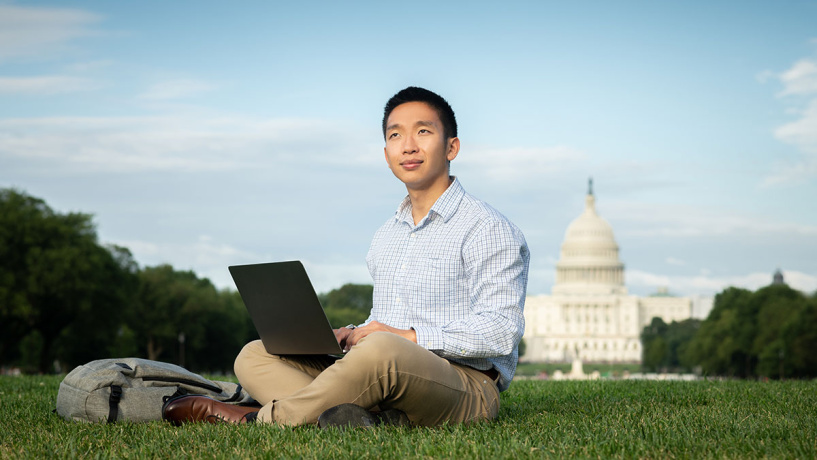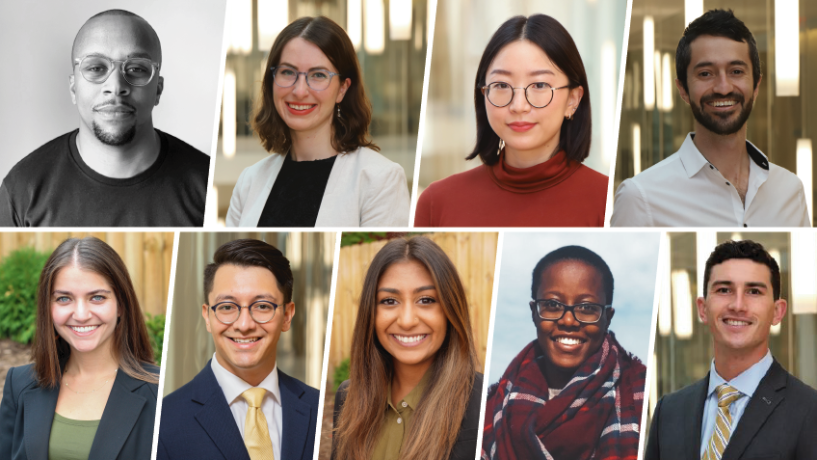Q&A: Hear from Six Michigan Ross Students Who Participated in a Business+Impact-Funded Internship this Summer

This summer, the Business+Impact initiative at the Ross School of Business provided funding for 57 University of Michigan students to pursue a wide variety of internship-style opportunities with a range of organizations, in both virtual and on-site experiences.
Of those internships, 29 students from Michigan Ross and the Ford School of Public Policy developed their skills while individually helping mission-driven organizations and around the world.
Each summer, Business+Impact awards competitive grants for summer internships to MBA and BBA students at Michigan Ross. MBA funding comes from the Give-A-Day Fund, an MBA student-led, pay-it-forward fund; and from General Motors. Additionally, the newly established Gordon Impact Entrepreneurship Fund provides support during the summer for BBA or MBA students with ventures or funders seeking to create societal impact.
Below, hear from six of the Michigan Ross BBA and MBA students who received funding for their summer internships with a mission-driven organization from Business+Impact this year.
Tanmay Arora, BBA '24
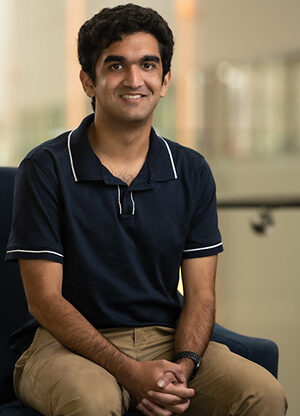 Describe the project you worked on for your internship.
Describe the project you worked on for your internship.
The project I worked on for my internship was a 10-page report made for the Great Lakes Board of Governors and Premiers on research about the voluntary carbon offset market, the current problems, and the policy recommendations to help the state of the market in the region. The organization our team worked with was the Global CO2 Initiative, which represents eight Midwest states and two Canadian provinces.
How did your work specifically help deliver social impact through this experience?
Our work helped deliver impact by making recommendations for this region to be a bigger player in the carbon offset space and to be able to have more sustainable solutions that not only reduce and avoid emissions, but even remove carbon dioxide from the atmosphere.
How do you predict that this internship will affect your career path?
I think this internship will be important for my career path because, as someone who wants to go into marketing down the brand management path, I found this role to be helpful. It gave me the opportunity to interview key stakeholders in the region who are affected by this market — and being able to understand who you are involved with and who you are potentially selling a product to is a crucial part of marketing.
How did the funding you received through B+I improve your internship experience?
I believe the funding allowed us to have access to many stakeholders and resources that could help us be more informed about the state of the market to help us best write our report.
What advice do you have for future interns?
For future interns, I believe that it is important to show resilience. There are times in the project where our team did not feel like we could make certain recommendations but we stuck to what we believed in and made sure we had the evidence to back it up!
Patrick Nguyen Burden, MBA/MS '23
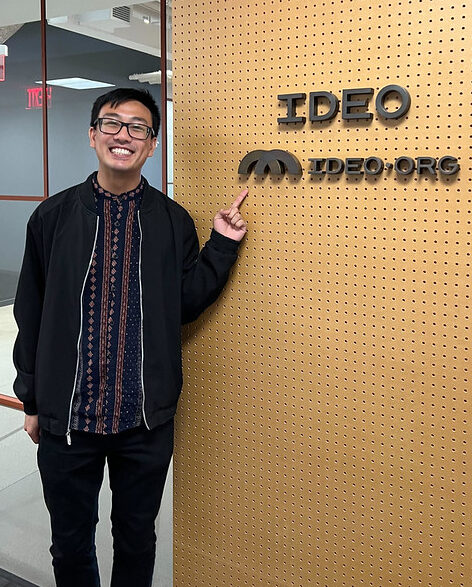 Describe the project you worked on for your internship.
Describe the project you worked on for your internship.
As a business design intern at IDEO.org, I worked to transform creative, human-centered ideas for social innovation into tangible, impactful, and enduring solutions. From crafting strategies and developing business models to facilitating design thinking processes, I had the opportunity to work on two different social impact initiatives focused on health equity and youth development during the summer. On my first project, I worked on informing the design of social media interventions that could support teens living with Type 1 diabetes in their care management journey. And on my second project, I helped design the strategic vision and plan for a youth literacy nonprofit to scale its impact and reach for more students.
How did your work specifically help deliver social impact through this experience?
Both of my projects were focused on helping organizations better understand how their programs and services could be better informed by human needs while also acknowledging the root causes of social disparities in both health and education. For example, improving the care management of teens meant taking a comprehensive approach around understanding the barriers to adopting healthy behaviors across diverse communities. It meant exploring how to combat misinformation around chronic illness through narrative change, while also caring for the holistic wellbeing of individuals so that teens living with Type 1 diabetes would have access to the support they needed, not only during health-related events, but across all their middle-term needs until adulthood. Similarly, my education project focused on addressing a large symptom of education inequity in the United States by exploring how tutoring services could be amplified and scaled to reach more students from underinvested schools, and investigating how to empower communities to support students in their journey of becoming lifelong learners with the skills needed to pursue postsecondary opportunities.
How do you predict that this internship will affect your career path?
Working at the intersection of business, design, and social impact has always been my dream. This internship only further validated my passion and determination to do this work by helping me build upon my existing experience with new skills and approaches and by granting me permission to lean into my creative confidence when leading. So much of this summer has been spent reflecting upon how else I can grow my thought leadership in this space while envisioning what this type of work could look like in other institutions. With aspirations of continuing this type of social innovation work, but within the context of corporate settings, I’ve been emboldened by my time at IDEO.org to rethink how businesses can be run to build better workplaces, better livelihoods, and better societal outcomes.
How did the funding you received through B+I improve your internship experience?
Working in the nonprofit space in New York City was honestly a dream come true for me, but it was also an opportunity that felt riskier compared to other traditional MBA internship options. Beyond supporting me while taking this risk and trying my hand in the nonprofit space, the funding from Business+Impact also elevated my internship experience by making in-person work possible for me, a critical piece to the nature of design work. Without this support, I wouldn’t have been able to build the amazing connections I did and find community with other practitioners in the design for impact space.
What advice do you have for future interns?
Your summer internship is more than just your day-to-day project work. Making time to get to know your colleagues and learn from them is just as important, and this alone has been one of the ways I’ve been able to elevate my expertise and thought leadership. Working in the impact space can look very different for everyone, so investigating how other people got there and where they see themselves going can lead to very illuminating conversations that will help inform the next direction for your career journey.
Emily Griffith, MBA '23
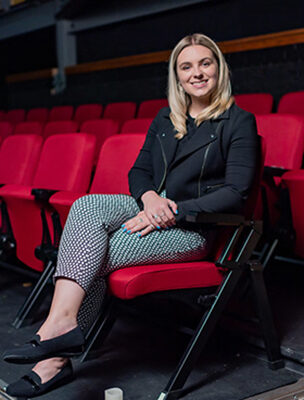 Describe the project you worked on for your internship.
Describe the project you worked on for your internship.
I worked for The Encore Musical Theatre Co., a professional regional theater company in Dexter, Michigan, on developing a long-term strategy. The goal was to help them begin conversations among key stakeholders about what the theater should look like and what additional revenue streams should be added to the business model to support its growth and provide more financial stability.
How did your work specifically help deliver social impact through this experience?
By helping The Encore build out its long-term strategy, I’m able to help set them up to be more financially stable by diversifying their revenue streams and growing their business. This will eventually help to bring better wages to the community of artists they employ and also ensure that they can continue to bring innovative art to the community.
How do you predict that this internship will affect your career path?
This internship has definitely taught me a lot about what I find to be meaningful work. I’ve learned that I like work that has a palpable impact and I like to see the work through implementation. This will be something I look for in future positions.
How did the funding you received through B+I improve your internship experience?
Without the funding I received from B+I, I wouldn’t have been able to participate in this internship experience. For small nonprofits like The Encore, engaging an MBA student can be a strain financially. B+I’s funding makes it possible for students to bring their skills to businesses who wouldn’t have access otherwise, expanding the impact we students can have during our internship.
What advice do you have for future interns?
This time is precious. Your time in the MBA program and interning is special and an opportunity that likely won’t come around again, so use it. Have a passion project or an area you want to dive into? Find a way to get in there now. You’ll have chances to get into your career later, but opportunities to have unique experiences like this one don’t happen every day, so seize the moment while you have it.
Jason Hefter, MBA '23
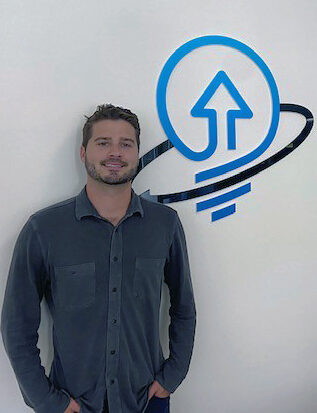 Describe the project you worked on for your internship.
Describe the project you worked on for your internship.
As an intern, my role involved performing market research and analysis on a variety of industries/topics, including the gig economy, esports industry, and security surveillance industry. This due diligence will help the founder build their company and find strategic entry points into the industry with a minimally viable product.
How did your work specifically help deliver social impact through this experience?
When working on my research for the gig economy, my focus was to find key pain points that affect gig workers. This research was used to assess what ways Launch Factory could create a product/service that serves gig workers and makes their work experience better, thus impacting their overall career for the better!
How do you predict that this internship will affect your career path?
I believe that my internship at Launch Factory has helped me not only better understand what it takes to build a company that is desired by the marketplace, but also what it takes to start a company, which is something I hope to accomplish in my career.
How did the funding you received through B+I improve your internship experience?
Receiving funding made this experience possible. Without it, I wouldn’t have been able to move to San Diego this summer for this experience.
What advice do you have for future interns?
Take risks and be curious. This is one of the only times we get to try many different things. If you don’t like the experience, you are still walking away with a valuable learning experience.
Sehrish Hussain, MBA '23
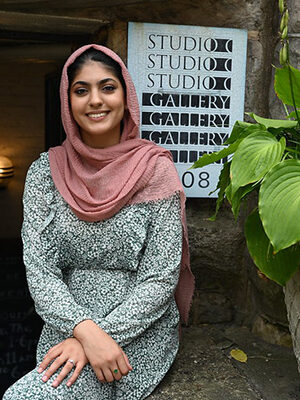 Describe the project you worked on for your internship.
Describe the project you worked on for your internship.
The main project I worked on this summer was analyzing user research to create a report that had three marketing recommendations on how to increase customer sales. Other projects included organizing inventory in the gallery, assisting the summer art camp held at the gallery, and assisting artists with installation of new exhibitions.
How did your work specifically help deliver social impact through this experience?
The work I did was at the Studio Gallery, which gives emphasis to showcasing the work of underrepresented artists and puts emphasis on community engagement. For example, I helped one of our fellows run an art camp at the gallery that included 18 kids from the Washington D.C. area and exposed those kids to an art education that they would not have otherwise received.
How do you predict that this internship will affect your career path?
My experience at the gallery exposed me to the business side of art from sales to working with clients. It will help me in any client-facing role in my future career.
How did the funding you received through B+I improve your internship experience?
Without the funding from B+I, I would not have been able to participate in this internship experience. I am extremely appreciative of the team to allow me to gain skills from this unique experience.
What advice do you have for future interns?
I would tell future interns to go into any internship experience ready to learn, and make it known to your supervisor what you want to learn from the experience. More often than not this will help you to take part in things you are interested in on the job.
Aiko Ueda, MBA/MS '23
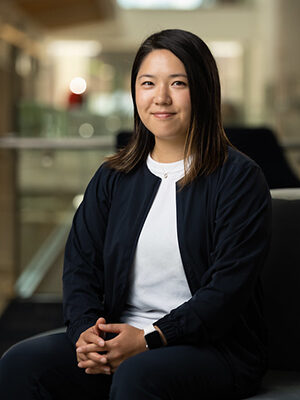 Describe the project you worked on for your internship.
Describe the project you worked on for your internship.
I was a research intern for the Global CO2 Initiative at U-M. I did research on voluntary carbon offset markets in the Great Lakes Region, including historical transactions, the criteria of high quality carbon credits, price, and market size. I then produced a report and suggested proposals to enhance the voluntary carbon offset market for the Governors and Premiers in the Great Lakes Region.
How did your work specifically help deliver social impact through this experience?
Companies around the world are eager to remove carbon from their operations and value chain, but they still have residual emissions. Carbon credits can be used to offset those emissions by investing in carbon removal projects such as reforestation and direct air capture. However, the use of carbon credits is controversial, since it might be greenwashing. Our research defines what are the opportunities and challenges in this space and proposes business and policy suggestions to enhance the voluntary carbon offset market in the Great Lakes region. Our research will address an urgent climate change issue by helping the Great Lakes Governors and Premiers to think about creating a good regional carbon strategy.
How do you predict that this internship will affect your career path?
I was interested in a wide range of topics, like climate tech, nature conservation, and corporate sustainability, and I’m surprised to realize that this carbon offsets space covers all these topics, so I really enjoyed researching this space and will continue to follow it. This internship provided me with an experience in this space so that I can utilize my knowledge and capability to find a job in this space.
How did the funding you received through B+I improve your internship experience?
I didn’t need to travel or attend conferences, but I can utilize the funding in the future to do further research by buying books, studying for certificates, and attending conferences since I will follow the topic that I researched during summer!
What advice do you have for future interns?
You should do something that reflects what you really want to learn during this internship. Thanks to B+I funding, I was able to focus on what I really wanted to pursue and gain deep insight in the social impact space, which really matters to me.
Read more about the Business+Impact-funded internships this summer





